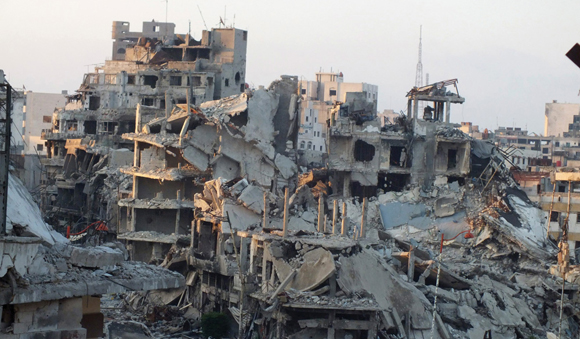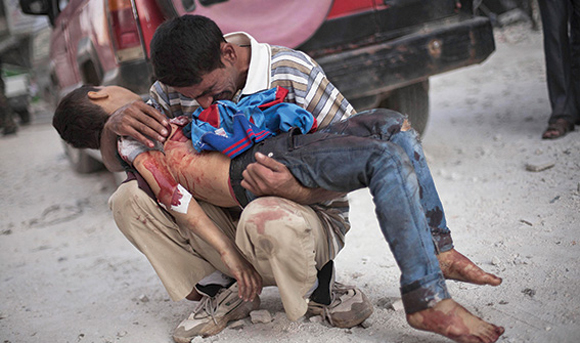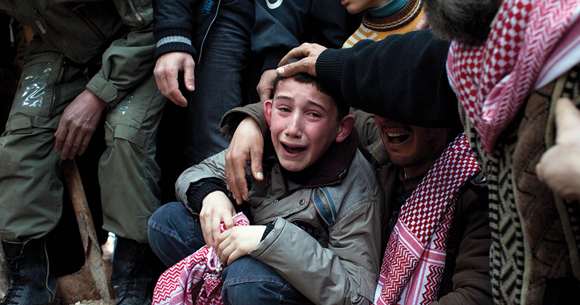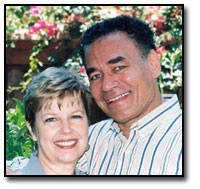Articles
Democracy in the Middle East
Muslim Arabs and Democracy
By Shira Sorko-Ram

The beseiged city of Homs, Syria, on July 13, 2013
The venerable Economist magazine posts a yearly list of most of the nations of the world, judging them in four categories:
- Full democracies: 25
- Flawed democracies: 54
- Hybrid regimes: 37
- Authoritarian regimes: 51
Are you aware that there is not a single Arab country in the world that is a full democracy?
In fact, there is not even a single Arab country in the world that is considered a “flawed democracy.”
There has never been in Islamic history a democratic Arab Muslim state. The reason – Sharia law and democracy are incompatible.
On the other hand, all 25 nations considered full democracies are of historical Christian background except South Korea and Japan. Although few would see the connection, interestingly, in the last few decades as Christianity grew in South Korea, the nation transformed from a brutal dictatorship into a genuine democracy.
A definition of true democracy must include free elections with universal suffrage and enlightened understanding by citizens – including equality, justice, freedom of speech, and of course, freedom to chose one’s religion, especially of minorities.
In Arab countries, of which all consist of an overwhelming majority of Muslims, there is no such thing as freedom to practice whatever religion you wish.
The third classification of The Economist, the “Hybrid regime” list, includes a variety of countries that don’t totally fit the authoritarian group.
A hybrid government, according to the acceptable definition, means the ruling elites generally keep themselves in power by non-democratic means, despite the presence of some institutional features of democracy. Elections are often not competitive, and political liberties and human rights are for those connected to the regime.
But the West is crazy about elections – and institutions such as The Economist find it difficult to call a dictatorship by its name if there is some sort of election, no matter how defective.
In that light, The Economist lists seven Arab regimes as hybrid. I myself do not see such countries as Libya, Lebanon, “Palestine” or Egypt as having any real democratic freedoms.
In many Arab nations, slavery is a major human rights issue. Other concerns are the common female genital mutilation in Muslim cultures, child labor, and human trafficking. Forget women’s rights or religious freedom.
The other fourteen Arab countries in the Arab League are considered unadulterated authoritarian regimes such as Saudi Arabia, Syria, Qatar, Sudan and the United Arab Emirates. (Democracy Index 2012, The Economist Intelligence Unit Limited 2013)
One more fascinating fact: There are actually two non-Arab nations with Muslim majorities that did make the “flawed democracies” list – Indonesia with 88% Muslim, and Malaysia with 61%.
However, as far as freedom for Christians or for Muslims who want to convert to Christianity, they belong squarely in the ruthless authoritarian regime category.
Conclusion: Unfortunately, there is no such thing as a Muslim country that practices true democracy.

A Syrian man weeps while holding the body of his son, killed by the Syrian army in Aleppo (APIMAGES)
DEMOCRACY BIRTHED FROM DEMOCRATIC-MINDED CITIZENS
As President George W. Bush discovered, no matter how noble the intentions and how powerful the military of America and its allies, neither Iraq nor Afghanistan will be anything but tribal autocratic regimes.
Ironically, the stronger the Arab dictator, usually the more stable his country. Arab Muslim culture among the common people cannot produce democracy and demands a strongman for stability.
Progressing towards democracy can only happen when the population – the people themselves – have a genuine revolution in their moral and political values, says, Dr. David Suurland, a researcher on the philosophies and modi operandi of Islamist and other movements. (timesofisrael.com, 6Sept2013)
A democratic government is the result of a democratic society, he asserts; not the other way around. Those who were hoping something good would come out of the “Arab Spring” had to believe that these Muslim populations were deeply longing for democratic reform.
Unfortunately, that hope was not based on facts. Just take a look at Egypt, Libya, Tunisia and Syria. The way to know if a civilian population is ready for democracy is to see if the protestors are contending for the rights of women, the right to freedom of religion or freedom of speech. Or are they rather clamoring for better economic conditions and less corruption – usually of the wealthy politicians connected to a dictator?
HATRED CREATES TERRORISM
One of the greatest obstacles to an Arab country becoming democratic is the education of Arab Muslim children, who from birth are taught to hate. Hate the Jews, hate Israel, despise Christians, and view women as second-class citizens.
We Israelis are constantly aware of the hate-filled text books that characterize Jews as monsters, an alien people who have never before lived in Israel, but who have come to steal the land of the “ancient” Palestinian people. Incidentally these books are paid for by the U.S. and EU taxpayers’ money.
Westerners who sing the glories of “Islam the peaceful religion” delusionally close their eyes and stop up their ears.
ARAB CITIZENS WANT SHARIA LAW
A culture mirrors its government. Gallup polls give examples of the desires of “we the people” in Arab countries. When asked if Sharia law should be the only source of legislation, 66% of Egyptians, 60% of Pakistanis and 54% of Jordanians said “yes.”
Let’s compare Pakistan and Jordan – who have a similar Islamic fundamentalist culture. Both peoples are deeply conservative Muslims. Pakistan has a certain form of “free elections” while Jordan is ruled by a dictator – fortunately a benevolent and wise one. Jordan is as stable an Islamic nation as they come, even giving certain limited freedoms to Christians, while Pakistan is a hotbed of terrorist activity. Free elections alone do not a democracy make!
In the March 2011 Maoz Israel Report, I provided statistics of an Egyptian opinion poll. Just before elections were held, 59% said they backed Islamists while 27% opted for modernizers. Asked about Islamic influence over their politics, 95% were in favor!
When a PEW research poll found that 86% of Egyptians support executing any Muslim who changes his religion, you can know Egyptians will not birth a democracy, no matter how much the U.S. and Europe pressure them to become democratic by hurrying up and having another election.
Even the European Court of Human Rights found that Sharia law is incompatible with the concept of a “democratic society” and the “fundamental principles of democracy.” (https://hudoc.echr.coe.int/sites/eng/pages/search.aspx?i=001-60936)
“Data from the Arab world consistently shows a severe lack of democratic values not only on the side of the rulers, but also more importantly, on the side of the population itself. Marred by endemic racism, Jew hatred, institutionalized religious intolerance and a tribal political culture fueled by sectarian hatred, many Arab societies are apparently still at the most primitive stages of political development,” Suurland explained. (https://blogs.timesofisrael.com)
ISLAMIC LEADERSHIP FOR ISLAMIC PEOPLES
Therefore, in Arab Muslim countries, you will find one of two types of leadership: (1) autocratic “secular” – less fundamentalist – which is often a military or tribal leader such as Saddam Hussein, Muammar Gaddafi and Hosni Mubarak; (2) an autocratic Islamist – such as we find in Iran’s Mullahs, Afghanistan’s Taliban, Lebanon’s Hezbollah, and Gaza’s Hamas.
Even though Muslim dictators may not be very religious, they still tend to involve themselves with Sunni-Shiite wars or the Israeli-Palestinian conflict. Most of all, the “less religious” dictators fear Islamists such as the Muslim Brotherhood, al-Qaeda and the many Jihadist groups since the Islamists see their goal as conquering the world, including other Muslims who don’t agree with them.
Of course virtually all Israelis know that the Islamist dictators tend to be the most dangerous. For that reason, there was no joy when Muslim Brotherhood Mohamed Morsi was elected president of Egypt.
Morsi might have succeeded to turn Egypt into another Iran if he could have healed the economy. But, not being an economist, he focused on what he knew best – turning all the “semi-secular” institutions created by Egypt’s former military dictators into a Sharia regime.
Sharia-driven dictators hate Israel more than most military/tribal Arab dictators. (Assad is an exception!) When voted in as president, Morsi was working to break the peace treaty with Israel, arm Hamas in Gaza and let jihadists take over the Sinai desert, the better to launch rockets on Israel’s seaport, Eilat.
Watching American leadership back the “democratically elected” Morsi was painful to watch from Israel’s perspective. And now that the military has taken over, though they are no lovers of Israel, there is strong cooperation between Egyptian and Israeli security. Egypt’s new leader, General Sisi knows that the jihadists are his enemies – and as the old Middle East saying goes, the enemy of my enemy is my friend.
No one knows for sure if Egypt’s military will be able to hold on to the reigns. Much depends on whether or not the military can do something to improve the economic status. If not, there will probably be another “revolution” with another “democratically elected” leader.

A child mourns his father who was killed by a Syrian army sniper in north Syria (APIMAGES)
WHAT ABOUT SYRIA?
Israel’s leaders know from experience there is a better chance for stability with a secular military dictator than an Islamist dictator. That is why some Middle East experts fear that as bad as Assad is, an Iranian type Mullah replacement could even be worse.
But no matter who wins in Syria, this country will not become a democratic nation. Any intervention of the West in Syria will do nothing to bring a freer society to that land. The minority moderates in the free Syrian army coalition are divided, outgunned and cannot rival the main two competitors for the throne: Assad, the military dictator vs. al-Qaeda Islamists.
Even ridding Syria of chemical weapons, if that is possible, will not address the root cause of Syria’s conflict. Fundamental democratic values must be present in a society and in the spirit of a population before any structural improvement in human rights can even be hoped for. (Ibid.)
Suurland makes a very astute observation: “The founding of democracy in America was the result of miserable political conditions in Europe. The explosion of human rights instruments in the 1950’s was a direct result of the Holocaust.
“As history has attested time and again: It is only in the face of the most extreme barbarism that the most deeply embedded [negative] values of a society can be uprooted and replaced by better ones… The current human rights drama in Syria could be such a catalyst and the Western world would be wise not to intervene. Let the Arab world experience what it means to suffer the dark fruits of the racist and ethnic hatred they wish unto others,” he advises.
“In the meantime, Suurland warns, “don’t let the gruesome images of the chemical attacks in Syria lead you astray. If these attacks by Syrian government troops or rebels occurred against civilians in Tel Aviv or Washington, the perpetrators would become venerated heroes, martyrs, and have schools named after them by their fellow Syrians. For those who doubt the veracity of this claim I need only to point at the myriad of examples in Gaza, the West Bank or Lebanon.”
Just recently, all the 104 Palestinian convicted murderers that were released by Israel in order that the Palestinians would agree to start negotiations for a Palestinian state, received huge welcome-home heroes’ events, along with a hefty monthly salary – again paid by the U.S. and the EU tax payers.
A PEW Research Center poll found that 62% of Palestinians answered that suicide bombings were sometimes or often justified… (www.israelnationalnews.com, 11Sept2013) Take a moment to imagine what kind of Palestinian dictatorship (democratically elected no doubt) would implant itself 20 minutes from Tel Aviv if the West succeeds in bringing about two states for two peoples.
As tragic as the conflagration in Syria is, we must be aware that the political and moral fabric of Arab societies has brought this catastrophe on themselves. To transition towards any kind of democracy, they must come to grips with their own religion’s paucity of human dignity and worth. A wise secular dictator could actually begin the process by pulling the hate-filled schoolbooks, get Hitler’s Mein Kampf off their best sellers list, cut the TV programs that display Jews and Christians as little and big Satan’s, and make speeches about the equality of all mankind. That would be a start.
ETERNAL TRUTHS
Syria, along with other Arab nations, has attacked Israel three times since the birth of the Jewish nation. Syria has always been known to Israelis as the fiercest of all fighters among our neighbors. In the spiritual realm, the Bible says, “The grass withers and the flower fades, but the Word of our God stands forever.” The Bible also says, “I will curse those who curse you (Israel).” Let us pray that during this terrible civil war in Syria that the nominal Christian communities who now fear for their lives will seek the face of God. Let us pray that Moslems will cry out to God, and be visited by the True God in visions and dreams. May revival break out in Syria.
About the Author

Ari and Shira Sorko-Ram are the founders of Maoz Israel Ministries. The mission of MAOZ is: 1) To declare the Message of Messiah and make disciples in the city of Tel Aviv and throughout Israel. 2) To raise up Israeli leaders to prepare for the coming spiritual awakening among the people of Israel. 3) To educate and inform Christians world-wide of the strategic importance of Israel and the Jewish people in God’s plan for world revival. The MAOZ web site is https://www.maozisrael.org/.